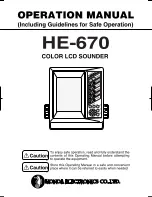
1. INSTALLATION
3
1.3
Transducer
The performance of the fish finder largely depends upon the transducer position. Select a place
least affected by air bubbles since turbulence blocks the sounding path. The face of the transducer
must be facing the sea bottom in normal cruising trim of the boat. Further, select a place least in-
fluenced by engine noise. It is known that air bubbles are fewest at the place where the bow first
falls and the next wave rises, at usual cruising speed.
Do not install the transducer inside the hull. Performance cannot be guaranteed.
1.4
Optional Speed/Temperature Sensors
ST-02MSB, ST-02PSB
1.4.1
Mounting considerations
• Select a mid-boat flat position. The sensor does not have to be installed perfectly perpendicular.
However, the sensor must not be located where it may be damaged in dry-docking operations.
• Select a place apart from equipment generating heat.
• Select a place in the forward direction viewing from the drain hole, to allow for circulation of cool-
ing water.
• Select a place free from vibration.
• Do not install near the transducer of an echo sounder, to prevent interference to the echo
sounder.
1.4.2
Mounting procedure
1. Dry dock the boat.
2. Make a hole of approx. 51 mm in diameter
in the mounting location.
3. Unfasten the locknut and remove the
sensor section.
4. Apply high-grade sealant to the flange of
the sensor.
5. Pass the sensor casing through the hole.
6. Face the notch on the sensor toward boat's
bow and tighten the flange.
7. Set the sensor section to the sensor casing
and tighten the locknut.
8. Launch the boat and check for water leak-
age around the sensor.
Locknut
123
Face "notch"
toward bow.
Flange nut
Coat with
marine sealant.
51
Brim
ø77
Summary of Contents for NXT-600
Page 1: ...NETWORK FISH FINDER DFF1 UHD OPERATOR S MANUAL www furuno com Model ...
Page 2: ......
Page 38: ...26 Aug 2014 H MAKI D 1 ...
Page 43: ......



























